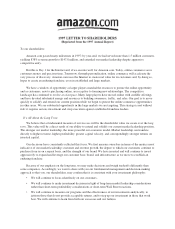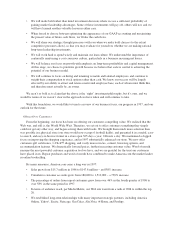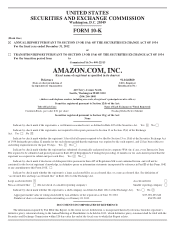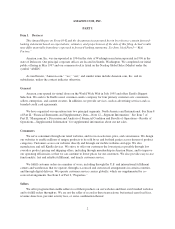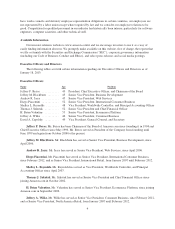Amazon.com 2012 Annual Report Download - page 14
Download and view the complete annual report
Please find page 14 of the 2012 Amazon.com annual report below. You can navigate through the pages in the report by either clicking on the pages listed below, or by using the keyword search tool below to find specific information within the annual report.We May Not Be Successful in Our Efforts to Expand into International Market Segments
Our international activities are significant to our revenues and profits, and we plan to further expand
internationally. In certain international market segments, we have relatively little operating experience and may
not benefit from any first-to-market advantages or otherwise succeed. It is costly to establish, develop and
maintain international operations and websites and promote our brand internationally. Our international
operations may not be profitable on a sustained basis.
In addition to risks described elsewhere in this section, our international sales and operations are subject to a
number of risks, including:
• local economic and political conditions;
• government regulation of e-commerce, other online services and electronic devices, and competition,
and restrictive governmental actions (such as trade protection measures, including export duties and
quotas and custom duties and tariffs), nationalization and restrictions on foreign ownership;
• restrictions on sales or distribution of certain products or services and uncertainty regarding liability for
products, services and content, including uncertainty as a result of less Internet-friendly legal systems,
local laws, lack of legal precedent, and varying rules, regulations, and practices regarding the physical
and digital distribution of media products and enforcement of intellectual property rights;
• business licensing or certification requirements, such as for imports, exports and electronic devices;
• limitations on the repatriation and investment of funds and foreign currency exchange restrictions;
• limited fulfillment and technology infrastructure;
• shorter payable and longer receivable cycles and the resultant negative impact on cash flow;
• laws and regulations regarding consumer and data protection, privacy, network security, encryption,
payments, and restrictions on pricing or discounts;
• lower levels of use of the Internet;
• lower levels of consumer spending and fewer opportunities for growth compared to the U.S.;
• lower levels of credit card usage and increased payment risk;
• difficulty in staffing, developing and managing foreign operations as a result of distance, language and
cultural differences;
• different employee/employer relationships and the existence of works councils and labor unions;
• laws and policies of the U.S. and other jurisdictions affecting trade, foreign investment, loans and
taxes; and
• geopolitical events, including war and terrorism.
As international e-commerce and other online services grow, competition will intensify. Local companies
may have a substantial competitive advantage because of their greater understanding of, and focus on, the local
customer, as well as their more established local brand names. We may not be able to hire, train, retain, and
manage required personnel, which may limit our international growth.
The People’s Republic of China (“PRC”) regulates Amazon’s and its affiliates’ businesses and operations in
the PRC through regulations and license requirements restricting (i) foreign investment in the Internet, IT
infrastructure, retail, delivery, and other sectors, (ii) Internet content and (iii) the sale of media and other
products. For example, in order to meet local ownership and regulatory licensing requirements, www.amazon.cn
is operated by PRC companies that are indirectly owned, either wholly or partially, by PRC nationals. Although
we believe these structures comply with existing PRC laws, they involve unique risks. There are substantial
uncertainties regarding the interpretation of PRC laws and regulations, and it is possible that the PRC
7


